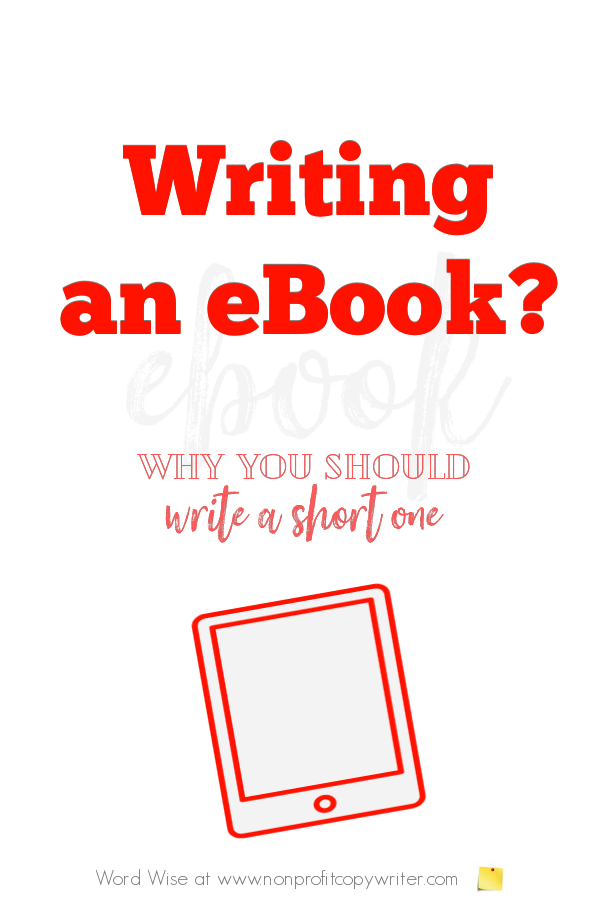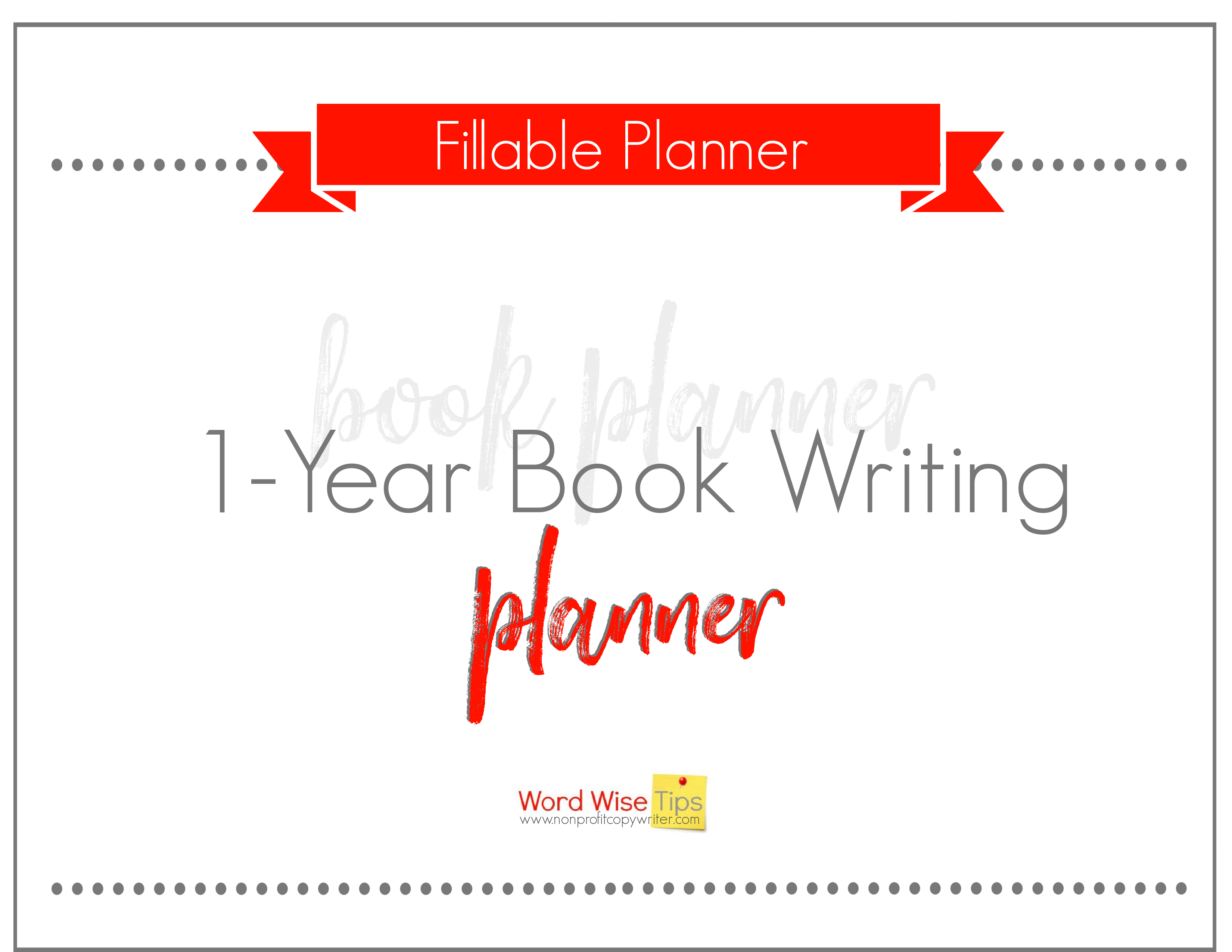Save Time: Get 5 Simple Writing Tips
you can put to use in 10 minutes
Writing an eBook — But Need a Jumpstart?
Award-winning writer Kathy Widenhouse has helped hundreds of nonprofits and writers produce successful content , with 750K+ views for her writing tutorials. She is the author of 9 books. See more of Kathy’s content here.
Updated 5.26.25
Writing an eBook can seem like a monumental task.
For one thing, those of us lacking a tech gene shudder at the little “e” in front of “eBook.” That “e” stands for “electronic.” An eBook writer must move a typed manuscript to a digital format, load it into an electronic platform, and market it — or hire someone to do. All of that digital malarky can make writing an eBook appear to be impossible.
That said, I’m not a techie yet I’m squarely in the eBook writing camp. And I have not spent thousands or even hundreds to pay a contract worker to do the heavy technological lifting for my eBooks. Instead, I’ve discovered that plenty of resources are available for technically challenged eBook writers — resources that allow us to create covers, format manuscripts, publish, and market our precious printed work.
No, the “e” part of writing an eBook isn’t the biggest issue for me. I suspect it’s not the main stumbling block for you, either.
Instead, what gets in our way is the “writing” part of “writing an eBook.”
Writing an eBook is intimidating because it’s a book. And a book can be a big project. Historically, the average nonfiction book is 60,000–80,000 words. And a novel can clock in at 120,000 words.
But when you can get past the “writing” part of writing an eBook you’ll find the process is addictive. Let me suggest a way you can get over that eBook writing hump. The tip is this: write a short eBook.
Is there a market for short eBooks?
By writing an eBook that’s short, you give yourself the chance to complete a project. Along the way, you learn about the self-publishing process as you send your eBook out into the world. Your confidence grows and so does your writing momentum. And you start building a base of readers.
Another advantage to writing a short eBook: there’s a good market for them. At last check, one-quarter of Amazon’s Kindle collection are short reads. A short eBook offers readers the chance to try a new genre or a new author, like you. Plus, when a book is written well and delivers its message in fewer pages, the reader walks away with an actionable step, a new insight, or at the very least a feeling of satisfaction — in less time.
And while a traditional print book is sold largely through brick-and-mortar and virtual stores, you’ve got several options for getting your short eBook into a reader’s hands.
Use this 1-Year Book Writing Planner (fillable and re-usable) to get your eBook done ...
Where to offer your short eBook
1. Offer your eBook on your website or blog
Also called a lead magnet, free download, or simply a freebie, your eBook can be an incentive that you give to readers and potential clients in exchange for their email address and permission to send information. A short eBook is an excellent way to offer enticing, valuable information to users that you want to turn into regular readers and fans.
As an added benefit, when you offer your eBook on your website or blog, you eliminate angst about publishing by simply saving your eBook as a PDF.
2. Offer your eBook at a retail eBook store
Retail eBook stores have sprung up all over the internet: Kindle (KDP), Apple, Kobo, NookPress, iTunes Connect, Smashwords, BookBaby, Draft 2Digital. Your problem will not be in finding an eBook store, but rather in choosing one or two or five where you can distribute your product.
3. Offer your eBook as an information product
You can also sell your eBook on an affiliate marketing network, like ClickBank, that hosts products like eBooks, software, online courses, and membership sites.
This is a particularly attractive option if your eBook is a how-to or if you offer very practical information. Online publishers can promote your eBook for you and in turn, you pay them a commission from every sale they make on your behalf.
Get started writing an eBook by writing a short one
Writing an eBook can be a manageable project — especially if it’s short. While the average Kindle book length is about 300 pages (75,000 words), a short eBook is half that or less. Anyone can publish a short book on Amazon in Kindle Short Reads. Yes, that means you, even if you choose not to submit it to Kindle Direct Publishing (KDP) editors as a potential Kindle Singles feature.
A Kindle Short Read is classified by the time it takes for readers to consume it. Classifications are calculated by assuming the average adult can read 250 words per minute. A few quick estimates help you see how short a short eBook can be.
- 15 minutes (1–11 pages): up to 3,000 words
- 30 minutes (12–21 pages): about 3,000- 5,000 words
- 45 minutes (22–32 pages): about 5,000–8,000 words
- One hour (33–43 pages): about 8,000–10,000 words
- 90 minutes (44–64 pages): about 10,000–16,000 words
- Two hours or more (65–100 pages): about 16,000–30,000 words
The recommended minimum for Kindle Short Reads is a ten-page book, totaling 2,500 words. But even a 40-page book clocks in at just 10,000 words. That’s the equivalent of four or five long blog posts or articles. You can manage that, can’t you?
Writing a short eBook opens more doors
Put that way, writing an eBook seems much less overwhelming.
But before you’re convinced to go short, let me add one caveat. To gain traction and earn credibility, your eBook must solve a specific problem (for nonfiction) or demonstrate a character’s clear life change (for fiction) — no matter its length.
That’s because readers want to know they will receive value from downloading your book and investing time in reading it. “Short Kindle eBooks can sell quite well,” says lithographer-turned-writer Derek Haines. “But you need to offer value to an eBook buyer.”
Maybe that means you may need to whittle down your book’s focus. Perhaps you can choose a smaller problem or a more concise solution to address in your eBook, especially when compared with your initial book concept.
And doing so can be to your benefit. By writing this one short eBook, you inadvertently can create a group of fans who want to read your next work because they’ve enjoyed the first one. That opens the door for you to write another short eBook to solve the same problem in a different way or a book that solves a related problem.
So you write a second eBook. It pulls in yet another group of readers who join your first set of enthusiasts. And as you gain even more confidence, you write another eBook.
Now, you’re not only in print, but you’ve got a group of fans. Your bank account has accumulated royalty checks along the way, too.
All because you got past the “writing” part of “writing an eBook.”
More eBook Writing Tips
Get Started Writing eBooks: A Simple Tutorial ...
Why You Should Write an eBook: 5 Reasons to Consider It ...
How to Write an eBook Fast ...
eBook Writing Software: The Lowdown on Tools for Writing eBooks ...
The Best Product to Sell Online (Especially for Writers) ...
1-Year eBook Writing Planner (Fillable and Re-Usable) ...
E-Books Versus Print Books: Which Do Readers Prefer?
Ebook Writing Tips: What’s the Best Book Word Count for eBooks?
Writing eBooks: Frequently Asked Questions ...
Should You Write a Free eBook? Take This Quiz to Find Out ...
See more tips for Writing a Book on my Pinterest board...
Return from Writing an eBook - But Need a Jumpstart?
to Nonprofit Copywriter home
As an Amazon Associate I earn from qualifying purchases.
Share This Page

Named to 2022 Writer's Digest list
BEST GENRE/NICHE WRITING WEBSITE


Stop Wasting Time!
Grab your exclusive FREE guide, "5 Simple Writing Tips You Can Put to Use in 10 Minutes or Less"













